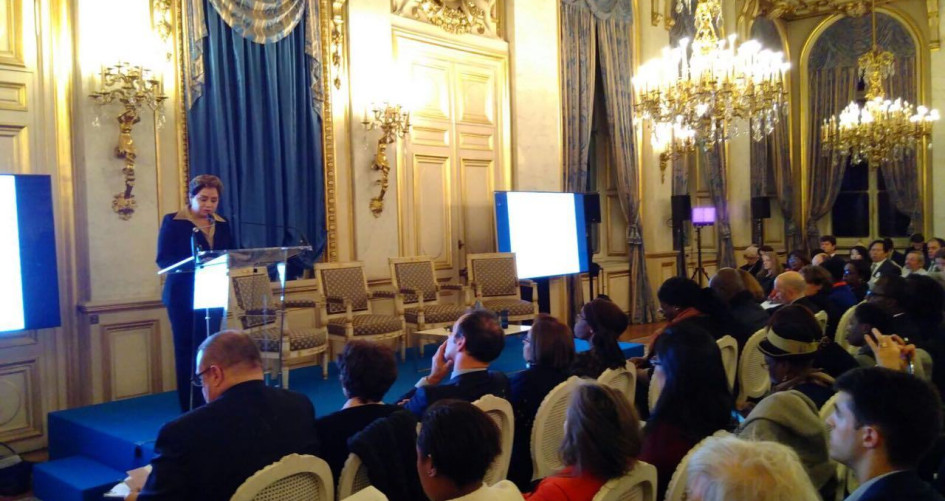The 2017 United Nations Climate Change Conference (COP23) in Bonn, Germany made significant progress on gender-related issues with the adoption of the Gender Action Plan. In the following speech, delivered at a Climate Finance Day side event in Paris, France on December 11, 2017, UN Climate Change Executive Secretary, Patricia Espinosa reminds participants that investing in women unlocks amazing potential and provides climate change solutions.
Read her full address here:
Ladies and gentlemen, it’s a pleasure to be here.
In climate change discussions, we use a lot of numbers and statistics. They’re important, but rarely tell the whole story.
To truly understand how gender relates to climate change, context is vital. This is especially so when it comes to financing.
Picture a woman living in an underdeveloped nation. She’s poor, as is her family, and other women in her village.
She has five kids, but also works in the fields throughout the day. She does the same heavy lifting as a man, but her pay at the end of the day is significantly lighter.
At home, she’s also responsible for feeding her family. She cooks on an indoor charcoal stove, so her exhaustion, mixed with the fumes, are slowly killing her.
Yet, she never feels like a victim; she has a great idea for a business that will benefit families like hers. Perhaps it’s solar cooking stoves. But all her money currently goes to survival.
This situation is reality for millions of women in the world.
Yet we still hear things like “what does gender have to do with climate change financing?” Well, everything.
By not factoring women in and by supporting their engagement including access to, for example, a bank account, we are underachieving on climate action when we need to overachieve and overachieve fast.
Research by UN Women, UN Environment and many others show that empowered women are great entrepreneurs in areas like renewable energy.
This is precisely because they understand the multiple economic, social and environmental benefits for their families and communities by having it.
By directing finance to these women—women everywhere—we can tackle more than climate change: we can address our sustainable development goals as well.
On the contrary, by leaving women not only out of financing, but the climate change process, means shutting out more than 50% of the population. This is unacceptable.
COP23 in Bonn made significant progress on gender-related issues with the adoption of the Gender Action Plan.
The Plan seeks to advance women’s full, equal and meaningful participation and to promote gender-responsive policy. Not at just one level—all levels.
It’s a turning point for gender and climate change.
But this is only a beginning. Our work needs to be matched by ambition on financing.
The fact remains that funding that takes gender into consideration is surprisingly small.
Through a building of trust for more co-operative action between member states and non-state actors, this can change. Gender must be at the center of that discussion.
At UN Climate Change, we know that investing in women unlocks amazing potential and provides climate change solutions, because we’ve seen proof.
Consider our Momentum for Change initiative.
It shines a light on innovative examples of what people across the globe are doing to combat climate change.
These are projects that build up people and communities while addressing climate change. Here’s an example.
In 2016 we highlighted an association of women-led groups in Uganda: women whose agriculture work was ignored.
They formed an association of women-led groups that collected individual savings of at least one dollar a week to generate a pool of funds.
Women then drew on those funds and invested them in income-generating activities that addressed climate change.
This included land planning, agro-forestry and soil conservation practices and the use of energy saving stoves.
The results are impressive.
More than 1,600 women-led associations have so far pooled $2.8 million from which to draw.
It has empowered more than 250,000 women, who are now economically independent and have increased access to production resources.
And about 182,000 women now own and have control over the land they use.
Almost 250,000 women have and own property, and generate an income of at least $300 dollars per month.
This works towards our Sustainable Development Goals, including:
- number 1 – no poverty;
- number 2 – zero hunger;
- number 3 – good health and well-being;
- number 5 – gender equality;
- number 8 – decent work and economic growth;
- number 9 – industry, innovation and infrastructure;
- number 10 – reduced inequalities;
- number 11 – sustainable cities and communities; and of course
- number 13 – climate action.
Ladies and gentlemen, where financial support is shown, women thrive. They are important agents of change and innovators, and they can affect change throughout society.
So, when it comes to finance, we need to get the message out that women are key if you truly want to shape inclusive, sustainable development.
It’s a matter of will. We know the money is there. What is in short supply is the trust and robust bases for cooperative action, between member states, and among them and other stakeholders.
But it also means making sure wealthy countries deliver what they’ve already committed to: namely, delivering $100 billion a year until 2020 and progress in strengthening our financial institutions, including the Green Climate Fund.
Ladies and gentlemen, we at the UNFCCC stand ready to work with all Parties and financial institutions to help them understand the important role of women as agents to help address climate change.
By unlocking funding that supports projects that include both climate and gender, investors can help build a world that is cleaner, greener and more prosperous…
…a world that is truly inclusive, one that encompasses all people, not just half of them.
A world that is better for today and for the future.
Thank you.
